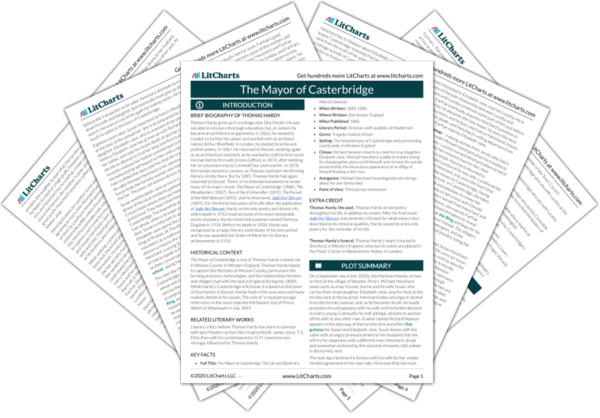Summary
Analysis
The next morning, Elizabeth-Jane opens their window to discover a conversation occurring between Henchard, in the street, and Farfrae, at the next-door window. Farfrae is departing and Henchard offers to walk with him to the top of town. Farfrae leaves the inn, bag in hand, and the pair sets off. Farfrae glances up at Elizabeth-Jane at the window, but does not acknowledge her, which makes the young woman feel slighted, despite reminding herself that they did not know each other.
The next morning, Henchard continues to be focused on Farfrae and convincing him to stay in Casterbridge. Elizabeth-Jane likewise is focused on him, to the point of feeling offended that he does not return her interest. Despite Farfrae’s brief stay in town, he is already the focus of the main characters’ (and the villagers’) attentions.
Themes
Susan says she has been thinking of Henchard’s sudden liking for the young Scottish man, and wondering if he takes so kindly to strangers, perhaps he will respond in kind to his own kin. Five large wagons of hay pass in the street, marked as part of Henchard’s business, renewing Susan’s conviction that she ought to try to rejoin the prosperous Henchard at least for her daughter’s sake.
Susan interprets Henchard’s focus on Farfrae as a mark of his newfound kindness. Henchard’s wealth persuades Susan that she needs to reconnect with him. More than anything, Susan is motivated by securing Henchard’s prosperity for her daughter.
Themes
Susan decides to send Elizabeth-Jane to Henchard with a note telling him of Susan’s arrival in town, her status as a sailor’s widow. She tells her daughter that if Henchard does not wish to recognize them to tell him that they will leave Casterbridge as quietly as they came. If he does wish to acknowledge them, he should arrange a way to see Susan.
Susan does not seek out Henchard directly, but sends Elizabeth-Jane with a note allowing Henchard the option of meeting with her or not. This tentative move allows the decision to be Henchard’s. Susan has followed her husband’s will in the past, and continues to do so here.
Themes
Elizabeth-Jane walks up High Street on the busy market day morning. The street is filled with vans unloading wares, shops displaying their items outside, livestock for sale, and farmers and townsfolk in the middle of business dealings. Casterbridge forms the center of the surrounding country life. All the signs of country life in this old market town are exciting and fresh sights to Elizabeth-Jane. Elizabeth-Jane arrives at Henchard’s home, one of the best in town, and finds the front door open revealing a passageways leading all the way to the garden at the back of the house. She is directed to an office in the store-yard.
The description of Casterbridge on market day demonstrates the key role that farming plays in the lives of these villagers. Because Henchard, and later Farfrae, are farming merchants, their economic importance in Casterbridge also makes them important in the social and political community. Henchard’s house is another physical indication of his success and wealth.
Themes
Get the entire The Mayor of Casterbridge LitChart as a printable PDF.

Elizabeth-Jane enters the office to find not Henchard, but Farfrae, pouring over some samples. Momentarily confused, Elizabeth-Jane recovers and asks to see Henchard. At the moment of Henchard and Farfrae’s parting on the road that morning, Henchard had spoken up again and persuaded the younger man to stay. Farfrae had exclaimed that this situation must be the work of Providence, and had agreed to become Henchard’s manager. Henchard, now confident and extravagant in his kindnesses, had welcomed Farfrae to a second breakfast and insisted the young man live in his house, at least until he could find other accommodations. Henchard then gave Farfrae a tour of the premises and of his business.
Farfrae’s appearance at Henchard’s is a surprise for both Elizabeth-Jane and for the reader. The novel then moves backward in time to account for Farfrae’s presence, explaining how Henchard persuaded the young man to stay. This twist in the narrative emphasizes Elizabeth-Jane’s surprise, and reinforces for the reader that Farfrae will be a main character in the text who will not disappear from Casterbridge, despite Henchard’s later wish to be rid of him.
Themes












